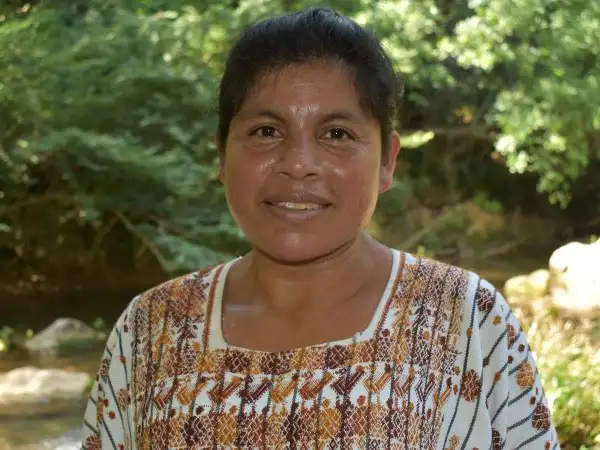

Olivia is standing up for her community’s right to return to their ancestral land in Guatemala
Guatemala is one of the most dangerous countries in the world for people defending the environment. We support human rights defenders in Guatemala and across Latin America to protect their territory, land and environment and stand up for their rights.
“When they arrived, my grandparents didn’t have time to pick up a single piece of clothing or cup of food before they were forced to flee” says Olivia, a passionate and determined Mayan community leader from Alta Verapaz in Guatemala.
In 1968, Olivia’s grandparents were brutally forced out of their homes. The entire community of Chicoyogüito was uprooted. The Guatemalan army wanted their land to build a military training centre. Eventually, the land the army occupied – known as Military Zone 21 – became a detention centre, as well as a site for massacres during Guatemala’s bloody civil war.
“When the armed forces arrived, they began to shoot, and people were beaten. People began to flee, and some fell into the river. Siblings were separated. Over 200 families were evicted," explains Olivia.
Left without land
Forced to leave their ancestral land, Olivia’s family moved to the city of Cobán in Alta Verapaz. “We have been left without land, houses, food – without clothes. We have no territory and no land to cultivate. There is no land on which to grow corns and beans.”
Olivia remembers her grandmother’s stories about their lives back in the community of Chicoyogüito. Olivia smiles. “My grandparents made a living growing corn, beans yucca and raising cattle. They had everything they needed. There was sacred water in the hills. Before, there was no sadness, no pain, no hunger.”
The connection to ancestral land runs deep. “Whenever I think of my grandmother being forced to flee, I feel her pain,” says Olivia with tears in her eyes.
To this day, the land of Chicoyogüito is being used as a UN peacekeeping training base and remains a military zone. Olivia is angry: “The army deny that our community of Chicoyogüito exists and they have never given us permission to enter.”
Find out more about protecting human rights defenders.
Fighting for their land
But Olivia is determined to return to her ancestral land. “After 40 years, the community of Chicoyogüito started to get together again. We are the children and grandchildren of Chicoyogüito. We must fight for our parents, our grandparents, our Mother Earth.”
When asked about her hopes for the future, Olivia speaks with passion: “I would like us to return to this land and for the soldiers to no longer be there. Our dream is that our children and grandchildren won’t suffer as we did.”
Thankfully, we are working with local experts at the Centre for Human Rights Legal Action (CALDH) to provide legal support to the community of Chicoyogüito – to prove that the community of Chicoyogüito exists and that its people have rights. This legal support is part of a three-year Regional Human Rights Defenders project in Latin America, co-funded by the EU. Together, we are focusing on people who defend their land, territory and environment, for the benefit of us all.
Breaking down the fear
CALDH provide both legal and psychosocial support. They are discovering the truth about what happened to the Chicoyogüito community and are helping to build a historical memory. They are working closely with the community to break down fear and silence, and to support people to better understand their rights.
“Our history, our memories, our stories and testimonies are being documented,” says Olivia, proudly. “We are carrying out a census and gathering documents to show how many people are part of the Chicoyogüito community. Every 21 July, we march for eight days and bring banners and things, to show people and the military that the Chicoyogüito community exists.”
CALDH are documenting the number of deaths and births relating to the Chicoyogüito community. They continue to challenge those in authority – those exempt from punishment due to their positions of power – who have allowed human rights violations to be committed against vulnerable communities simply defending their land.
Guatemala is one of the most dangerous countries in the world for people defending their land and the environment. Olivia is a mother. She worries about her work as a human rights defender. “I worry about my life because I have children. If something happens to me one day, what will become of them?”
We must not be silent
Despite these very real fears, Olivia remains wholeheartedly committed to her community’s struggle:
“For me, this project is about achieving justice – to achieve justice and fight for our territory. I want leaders and judges to respect our word as indigenous people, as human beings.
"My message to all human rights defenders across the world is that we must not be silent. Let us raise our voice as indigenous people. Let us raise our voice to show that yes, we do exist.
"Let us not give up. We are asking for justice for our dear brothers and sisters. This land gives us life.”
Tuesday 24 March was International Day for the Right to the Truth Concerning Gross Human Rights Violations and for the Dignity of Victims. Read more about our work with human rights defendersRead more about our work with human rights defenders

